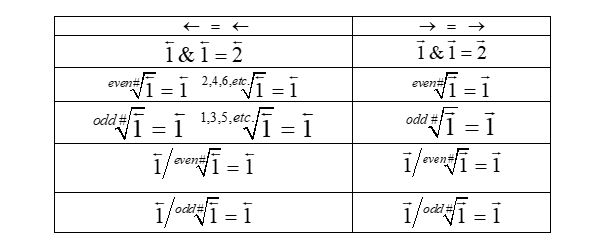On “Infinity” and “numbers”
-
On “Infinity” and “numbers”
I see a lot of people in here throwing the term “infinity” around as if that’s a number. Infinite space, infinite detail / fractal universe theories; infinity as the result of a calculation; Pi is talked about as if it was a number, despite being the result of an infinite sum.
Before we get into the word studies, a premise: definitions of words must match the definitions of related words, otherwise, we have evidence for a corruption of language. For example: adultery was re-defined by the church as intercourse without the blessing of a priest (church or government approved marriage). But the related words (to adulterate, adulterated, etc.) all have coherent meanings that differ from this definition. Adultery means the act of mixing, confusing, polluting, and in the context of the bible means the confusing or obfuscating of bloodline relations (via re-marriage, polygamy, “open relationships”, prostitution and what not — these all result in unclear relations between children and their multiple “possible parents”, as well as an obfuscation of degrees of relation). Remember, back in those days, the firstborn son became the head of the household, and inheritance was based on who the father was.
So, let us start from the very beginning of mathematics. The word “Number” is etymologically derived from the count of things, i.e., it is derived from the action of counting. If you look up the wiktionary for it, it is pretty clear. Especially if you filter out meanings that were added much later in history by modern mathematicians. A number, by its etymology, is the result of the process of counting/numbering things. Strictly speaking, only natural numbers can be considered numbers, by the meaning and origin of the word. Other things should have other names, because it makes a big difference.
Now let’s look at “infinity” or “infinite”: in-finite — non-ending. Also un-bounded, etc. Feel free to look that up on wiktionary, too. Again, ignore later re-definitions of the word by mathematicians, they have corrupted language with their re-definitions.
When you now combine both terms: infinite number, you arrive at the compound term: in-finite number — non-ending count. Tell me how a count that by definition never ends, results in anything whatsoever? This is nonsense. And Cantor with his aleph numbers and cardinality of infinite sets should be put into a hall of shame for his sophistry. If the counting of two things never ends (i.e., never yields any result), how can you then act as that result exists and call it a number? And then claim to examine properties of those? The treatment of infinities as numbers in mathematics have completely annihilated the meaning of infinity, creating an oxymoronic or meaningless framework. If terms are up for grabs and the name doesn’t need to have any special meaning related to what it is labelling, you are free to continue with your infinities, but I am incapable of accepting infinite things as existing, as did most ancient mathematicians.
Infinity has always been accepted as a possibility, a potential, and was used as an attribute to describe that you can use arbitrarily large values for some variable. But it was never intended to be become a value. I never understood what mathematicians mean by infinity, because the language they use to describe it is contradictory by its etymology. So if you guys talk about infinite universes, I can easily accept that space has no boundaries, because space is the potential for the position of things. But if you say that there is infinite detail, that defies imagination and understanding. For this reason, ancient Greeks already had the concept of an atom, an indivisible fundamental building block of everything.
You are using a word that has been corrupted by mathematics and no clear meaning (or even contradictory meaning, since the modern understanding of infinity is derived from infinite numbers à la Cantor), and you base your understanding of the universe on top of that. How can you understand something in terms of concepts that are invalid? Unless you can come up with a proper and clean definition to use for what you currently call infinity, your theories are fundamentally invalid.

